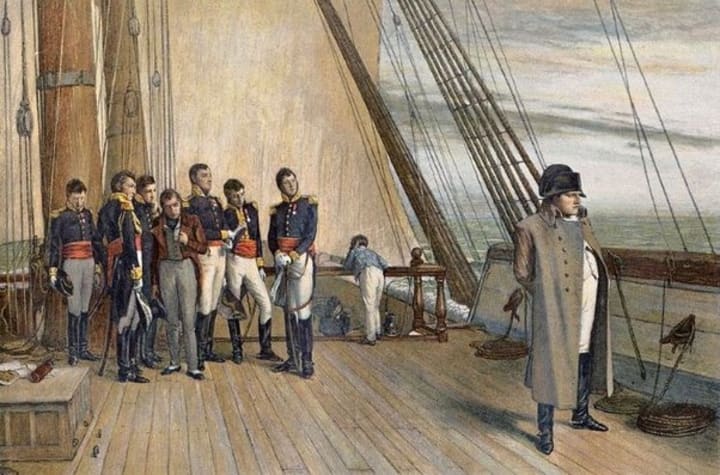Saint Helena's Ghost
How Napoleon's Exile Continues to Haunt History

Introduction
Napoleon Bonaparte, one of history's most iconic figures, faced a peculiar destiny following his defeat at the Battle of Waterloo in 1815. The fall of the French Emperor, a man who once commanded legions across Europe, culminated not in grandeur but in seclusion on the remote island of Saint Helena. This narrative transcends a mere exile; it unveils the intricacies of Napoleon's life during his tenure on this isolated outpost in the South Atlantic.
Arrival: Dusk Arrival and Initial Impressions
Imagine the scene: the HMS Northumberland, a vessel that once sailed triumphant seas, approached the shores of Saint Helena under the cover of dusk. Onboard, a man who once held the reins of power in Europe, Napoleon Bonaparte, disembarked discreetly, determined not to unveil his arrival in the glaring light of day. His first encounter with this secluded island was marred by disdain as he uttered with bitterness, "it is an unlovely place," upon stepping foot into the quaint settlement of Jamestown. His first lodging on the island offered him no greater solace.

Early Days: Briar's Pavilion and Strategic Significance
In the initial throes of exile, Napoleon found temporary refuge in Briar's Pavilion, courtesy of William Balcombe, an East India Company employee. Beyond being a host's residence, Saint Helena was historically significant, serving as a crucial juncture for Transatlantic trade. Discovered by the Portuguese in the early 16th century, this remote outpost became a strategic rendezvous for maritime commerce between Asia and Europe. The island's importance resonated through its Dutch and later, East India Company ownership, underscoring its pivotal role in global maritime routes.
The strategic significance of Saint Helena also extended to its physical defence. High Knoll Fort, a sentinel overseeing Jamestown, stood sentinel atop a steep promontory, once designed to defend the island against potential French rescue missions. Even as Napoleon resided at Briar's Pavilion, nestled at the base of this fortification, he remained under constant surveillance by its watchful sentries.
Transition to Longwood: Exile Conditions and Relationship with the British
After a transient stay at Briar's Pavilion, Napoleon's abode shifted to Longwood House in December 1815. The change of residences was intended to allow more privacy, but Napoleon found little relief upon arriving at Longwood. While the move offered more space and seclusion, the house itself was shrouded in discomfort. Reports portrayed it as damp, chilly, and, from the British perspective, significantly more secure, ensuring stringent oversight over the once indomitable emperor.
While Napoleon retained the liberty to traverse the island in the company of a British officer, he chose to confine himself mostly within the confines of Longwood's walls. His days were not bereft of activity; the former emperor spent time cultivating the grounds, indulging in extensive baths, engaging in literature, writing, dictating, and endeavouring to master the English language.
The emperor's new realm at Longwood, however, bore witness to a tumultuous relationship between Napoleon and the Governor of Saint Helena, Sir Hudson Lowe. The governor, devoid of addressing Napoleon by his imperial titles, strained their interaction. Lowe's treatment of his captive veered toward a more stringent demeanour, contributing to escalating tensions that remained throughout Napoleon's time on the island.

Challenges and Controversies: Napoleon's Health and Claims of Ill-Treatment
Amidst the confines of his isolated existence, Napoleon faced health issues, triggering allegations of mistreatment. As signs of illness surfaced, two dismissed doctors, Barry O’Meara and John Stokoe, cited concerns about Napoleon's well-being. O’Meara’s 1822 publication raised suspicions that the conditions imposed hastened the former emperor's death.
The allegations underscored the ongoing debate regarding Napoleon's demise. His deteriorating health led to speculations that the environment and the treatment meted out to him were contributory factors. Disputes arose over the circumstances leading to his death, perpetuating controversies that lingered for decades.
Cultural and Intellectual Pursuits: Legacy of Napoleon's Exile
Despite the trying circumstances, Even in his final days, Napoleon's intellect remained active. Several of his closest aides, including Emmanuel, Comte de Las Cases, General Gaspard Gourgaud, and Comte Charles de Montholon, spent long hours in discussion with their emperor, carefully documenting their conversations. These accounts delved into Napoleon's political philosophy, career reflections, and the conditions of his exile, revealing a multi-layered perspective of his final years.
The ex-emperor's exile also witnessed a notable literary pursuit. Lady Holland, the wife of a high-ranking British opposition politician, sent parcels of books to Napoleon, adding to his considerable collection. This gesture, rooted in considering Napoleon as a prisoner of State rather than War, underlined the intellectual pursuits that continued amidst his exile.

Tensions and the End: Napoleon's Death and Repatriation
Napoleon's tensions with the British authorities remained unresolved by the twilight of his life on Saint Helena. His wish to transfer to a healthier location was unheeded, deepening the strain between the ex-emperor and his captors.
Napoleon Bonaparte passed away on May 5, 1821, at 51. In his final moments, he reconnected with the Catholic Church and received the last rites from Father Angelo Vignali. The autopsy reports from both British and French examinations concluded that the former Emperor succumbed to stomach, intestinal, and liver ailments.
Following public display for two days, Napoleon's body found its initial resting place in the Sane Valley on Saint Helena. However, his desire to rest among the people of France was posthumously honoured. In 1840, at the behest of the July Monarchy, his remains were exhumed and repatriated to France, finding their final abode beneath the dome of the Place des Invalides.
The Legacy and Contested Narratives: Speculations Surrounding Napoleon's Exile
The passage of time has not quelled the contentious narratives and debates surrounding Napoleon's exile. Various theories, including claims of murder by poisoning, persisted long after his death. Disputes over the conditions of his captivity, his treatment by the British authorities, and the potential implications on his health and demise continue to be subjects of historical conjecture and divergent interpretations.
Napoleon’s final exile to Saint Helena, a chapter in history embedded in controversy and legend, remains a subject of fascination and scholarly inquiry, stirring debate and reflection on the complexities of power, captivity, and historical narratives.

Conclusion: Napoleon's Exile - A Complex Epilogue
Napoleon Bonaparte's exile to Saint Helena, a remote island in the South Atlantic, marks a poignant chapter in history, encapsulating the complexities of power, captivity, and historical legacy. His arrival on the island, the constraints of his captivity, and the intellectual pursuits amidst adversity paint a vivid picture of an ex-emperor grappling with his circumstances.
The intricacies of Napoleon's interactions with British authorities, his contentious relationship with Governor Sir Hudson Lowe, and the debates surrounding his health and eventual demise continue to captivate historians and enthusiasts alike, sparking debates that echo across generations.
The legacy of Napoleon's exile extends far beyond his death, leaving a contested narrative shrouded in speculation, historical inquiry, and conflicting interpretations. The lingering debates surrounding the conditions of his captivity and the circumstances of his passing add layers to an already complex historical figure, inviting continuous reflection on the nature of power, historical accounts, and the human experience.
As time unfolds, Napoleon's exile to Saint Helena remains an enduring tale, a convergence of political intrigue, personal struggle, and the enigmatic aura of one of history's most eminent figures, inviting a never-ending pursuit of understanding and reevaluation.
About the Creator
Richard Clements
Unearthing the Mysteries of History, Crime, and the Unknown
Delve into the captivating world of history, crime, and mystery through factual writing. Explore the past, unravel human behavior, and solve enigmas.
Enjoyed the story? Support the Creator.
Subscribe for free to receive all their stories in your feed. You could also pledge your support or give them a one-off tip, letting them know you appreciate their work.






Comments
There are no comments for this story
Be the first to respond and start the conversation.